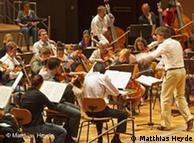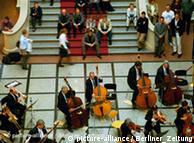ドイツで起きている音楽界の変化と将来像 [音楽時評]
ドイツの現状ですが, With its 90 opera houses, 130 orchestras and numerous concert halls, Germany is heaven for classical music fans. But changes are in store for this unique musical landscape, experts say.
90のオペラハウスがあり,130のオーケストラがあり,数知れないほどのコンサートホールがある, というユニークなドイツ音楽界が変化を求められているといいます.
以下のドイツ紙(英文)の記事の中に, German orchestras are already in a process of transformation, contracting by around 20 percent since 1990 as a result of closures and fusions. Financial pressures have mainly affected small and medium-size orchestras up to now. とあるように,音楽界は既に変化の過程にあり,1990年と較べて,オーケストラは閉鎖や合併によって20%縮小したといいます.ただ,それは小規模ないし中規模のオーケストラに生じてきたことだけれども, But big orchestras are unlikely to be spared in the long-term and they could also profit from change と大きな所も長期的には変わらざるを得ず,それが改善につながる努力が求められているといいます.
序曲,協奏曲,交響曲といったプログラムは当分存続するでしょうが,識者は, He warned of the threat of absolute paralysis if the existing unwieldy system were not forced open in some way. "These apparatuses are getting bigger and bigger and more and more expensive with every collective bargaining round, and every year there is a reduction in flexibility because there are no spare resources to support young musicians and good ideas, or to launch initiatives," と警告しています.
主要な方向性は次の3点です.第1に, He said he would like to see the musicians themselves being more involved in managerial processes and also taking more responsibility and more initiative in decision-making. と音楽家達にもっと経営に参加して責任を負い,決定にイニシャティブを取るよう求めています.
第2に,Rejuvenating audiences,聴衆の多様化で, "There will also be new types of concerts: commentated concerts, concerts that involve young artists, school classes, the handicapped and the elderly," he said. "By tapping into new audiences, orchestras will open up an extraordinary potential for the future." But more can be done, for example in getting young people from migrant families involved,
それには,演奏内容の変化,多様化も必要で, One way, he said, would be to incorporate more crossover projects with music from different cultures in the repertoires of the future. He would also like to see more contemporary music on concert programs.
第3に,コンサートホールは十分にあるけれども,将来は,もっとさまざまな機能性,適応性を持ったモノであるべきだといっています. there were enough concert halls already in Germany. If new venues were to be constructed, he added, they should be more adaptable than existing ones. "You have to approach it differently and discuss functionality again, and flexibility in the way musicians and the audience are arranged," he said. "And, in particular, there is a need for smaller flexible spaces alongside a large concert chamber, which you need, of course, for large symphony concerts."
以下は,ドイツの英字紙ですから,どうぞ渉猟下さい.わが国に当てはまることも多いと思います.
Music | 15.09.2009
Social change transforms the classical concert in Germany
Demographic and cultural changes in German society are bound to have an impact on the shape of concerts, orchestras and even concert halls in the years to come. This was the general consensus at a conference taking place as part of the Beethovenfest in Bonn.
Traditional concerts with overtures, concertos and symphonies will continue to exist in years to come, according to the managing director of the German Orchestra Association, Gerald Mertens, but not at the exclusion of everything else.
Rejuvenating audiences
"There will also be new types of concerts: commentated concerts, concerts that involve young artists, school classes, the handicapped and the elderly," he said. "By tapping into new audiences, orchestras will open up an extraordinary potential for the future."
Attracting young audiences is already seen as an important part of the work of most orchestras, and it is bearing fruit. But more can be done, for example in getting young people from migrant families involved, according to Mertens.
 Bildunterschrift: Großansicht des Bildes mit der Bildunterschrift: Orchestras are looking to diversify audiences
Bildunterschrift: Großansicht des Bildes mit der Bildunterschrift: Orchestras are looking to diversify audiences
One way, he said, would be to incorporate more crossover projects with music from different cultures in the repertoires of the future. He would also like to see more contemporary music on concert programs.
German orchestras are already in a process of transformation, contracting by around 20 percent since 1990 as a result of closures and fusions. Financial pressures have mainly affected small and medium-size orchestras up to now.
Profiting from change
But big orchestras are unlikely to be spared in the long-term and they could also profit from change, according to Folke Uhde, managing and artistic director of Berlin's Radialsystem, a new creative space for the arts.
He warned of the threat of absolute paralysis if the existing unwieldy system were not forced open in some way.
"These apparatuses are getting bigger and bigger and more and more expensive with every collective bargaining round, and every year there is a reduction in flexibility because there are no spare resources to support young musicians and good ideas, or to launch initiatives," said Uhde.
The managing director of the Deutsche Kammerphilharmonie Bremen, Albert Schmitt, also sees a need for reform. He said he would like to see the musicians themselves being more involved in managerial processes and also taking more responsibility and more initiative in decision-making.
The concert hall of the future
 Bildunterschrift: Großansicht des Bildes mit der Bildunterschrift: DSO Berlin has changed the dress code in its Casual Concerts series
Bildunterschrift: Großansicht des Bildes mit der Bildunterschrift: DSO Berlin has changed the dress code in its Casual Concerts series
As concerts and musical bodies evolve, it seems only natural that concert venues follow suit. What that will mean, however, is still up for discussion.
Uhde said that there were enough concert halls already in Germany. If new venues were to be constructed, he added, they should be more adaptable than existing ones.
"You have to approach it differently and discuss functionality again, and flexibility in the way musicians and the audience are arranged," he said. "And, in particular, there is a need for smaller flexible spaces alongside a large concert chamber, which you need, of course, for large symphony concerts."
Author: Klaus Gehrke (jg)
Editor: Kate Bowen





コメント 0